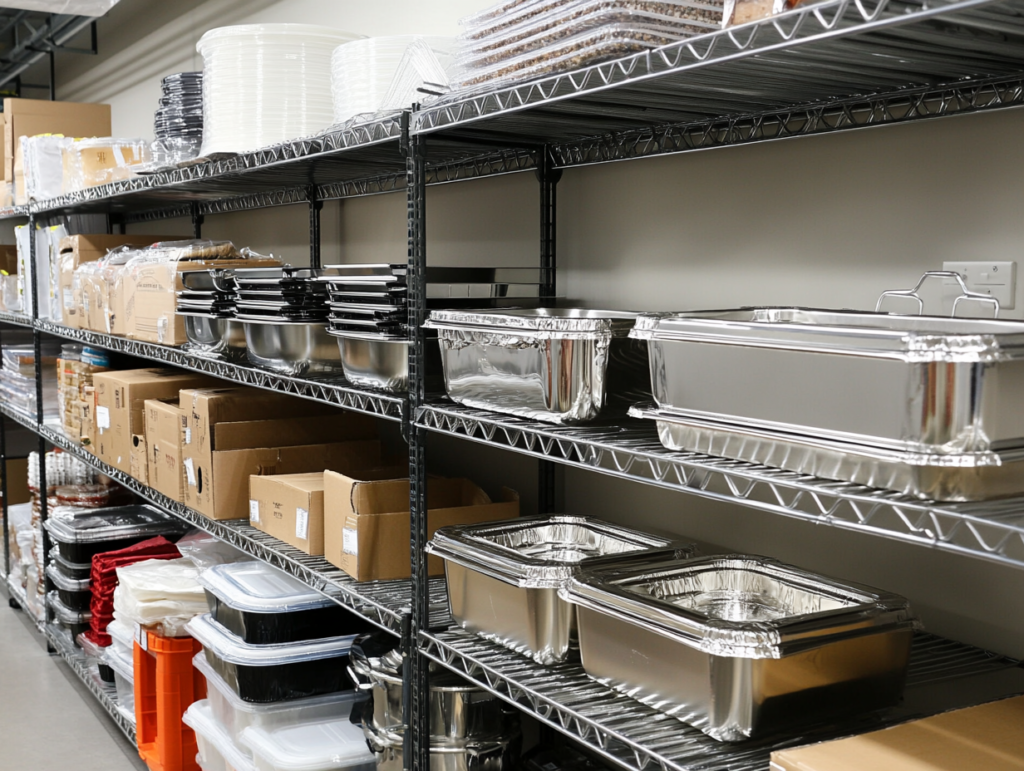How to Start a Catering Business
Are you ready to turn your passion for cooking into a thriving business? If you’ve been wondering how to start a catering business, this guide will walk you through everything you need to know to get started. From understanding the market to managing operations, I’ll share insights from my own journey in the catering industry to help you succeed.
Why Start a Catering Business?
Starting a catering business is an exciting opportunity for anyone who loves to cook and wants to share that passion with others. Here are a few reasons why this industry could be the perfect fit for you.
High Demand for Catering Services
The demand for catering services is strong and growing. Whether it’s for weddings, corporate events, parties, or other special occasions, people are increasingly outsourcing their food preparation to professionals. This creates a steady stream of potential clients who need reliable and high-quality catering services.
Moreover, the variety of events you can cater to means that there’s always a market for your services, regardless of the season. From intimate gatherings to large-scale corporate events, the opportunities are vast and varied, allowing you to specialize or offer a broad range of services.
Flexibility and Creative Freedom
One of the most attractive aspects of how to start a catering business is the flexibility it offers. You can choose your hours, the types of events you want to cater, and the scale of your business. This flexibility allows you to maintain a healthy work-life balance while pursuing your passion.
Additionally, catering provides a fantastic outlet for creativity. You can design menus, experiment with new recipes, and create unique dining experiences that reflect your culinary style. This creative freedom is not only personally rewarding but also a key differentiator in a competitive market.
Essential Steps to Start Your Catering Business

Ready to get started? Here are the essential steps on How to Start a Catering Business
Research and Market Analysis
Before diving in, it’s important to conduct thorough research and market analysis to understand the opportunities and challenges in your area.
Understanding Your Target Market
The first step is to identify your target market. Are you catering to weddings, corporate events, private parties, or all of the above? Understanding who your clients are and what they need will help you tailor your services and marketing efforts effectively.
For example, corporate clients may prioritize professionalism and efficiency, while wedding clients might be looking for a more personalized and luxurious experience. Tailoring your approach to meet the specific needs of your target market can set your business apart from competitors.
Identifying Your Niche
In the catering industry, having a niche can give you a significant advantage. Whether it’s specializing in vegan cuisine, gourmet desserts, or themed events, a niche helps you stand out and attract clients who are specifically looking for what you offer.
Your niche could also be based on the type of service you provide, such as full-service catering, drop-off catering, or buffet-style events. Identifying and developing your niche will help you refine your business model and target your marketing more effectively.
Legal Requirements and Business Setup
Setting up your business legally and professionally is crucial for long-term success. Here’s what you need to do.
Choosing a Business Name
Your business name is a critical part of your brand identity. Choose a name that’s memorable, reflects the nature of your business, and resonates with your target audience. Make sure the name is unique and not already in use by another business in your area.
Consider names that evoke images of delicious food, celebration, and quality service. For example, names like “Gourmet Gatherings Catering” or “Elegant Events Cuisine” can convey a sense of professionalism and excellence.
Registering Your Business
Once you’ve chosen a name, it’s time to register your business. Depending on your location, this may involve setting up a sole proprietorship, LLC, or another business structure. Registering your business not only legitimizes your operation but also protects your personal assets by separating them from your business liabilities.
An LLC is often a good choice for catering businesses as it offers liability protection while being relatively simple to manage. This structure can also make it easier to obtain insurance and qualify for business loans if needed.
Obtaining Licenses, Permits, and Insurance
Catering businesses are subject to various regulations, including health and safety standards. You’ll need to obtain the necessary licenses and permits to operate legally. This may include a food handler’s license, health department permits, and possibly a liquor license if you plan to serve alcohol.
Insurance is also critical. General liability insurance protects you in case of accidents or food-related illnesses, while business property insurance can cover your equipment and supplies. Ensuring you have the right coverage is essential to protect your business and build trust with clients.
Setting Up Your Catering Business

With the legalities in place, it’s time to set up the operational side of your business.
Acquiring Equipment and Supplies
Investing in the right equipment is crucial for delivering high-quality catering services. Depending on the scale of your business, you may need commercial-grade kitchen equipment, serving ware, transportation vehicles, and storage solutions.
Start by purchasing the essential tools you need for your specific services. As your business grows, you can invest in more specialized equipment that allows you to expand your offerings. Establish relationships with reliable suppliers to ensure you have access to quality ingredients and supplies.
Developing a Menu
Your menu is the heart of your catering business. It should reflect your culinary style, meet the needs of your target market, and be feasible for the scale of events you plan to cater. Consider offering a variety of options, including vegetarian, vegan, gluten-free, and other dietary accommodations to appeal to a broader range of clients.
Regularly update your menu to keep it fresh and exciting. Seasonal ingredients and new recipes can help keep your offerings relevant and appealing to repeat clients.
Establishing a Brand and Logo
Your brand is what sets you apart from the competition. A professional logo and consistent branding across all your marketing materials will make your business more recognizable and memorable to potential clients.
Work with a graphic designer to create a logo that captures the essence of your business. Your logo should be simple, versatile, and easily recognizable. Once your branding is in place, use it consistently across your website, social media, business cards, and vehicles to build brand recognition.
Building an Online Presence
In today’s digital age, having an online presence is essential for attracting and retaining customers. Start by creating a professional website that showcases your services, menus, and contact information. Include a portfolio section with photos of past events to demonstrate your expertise.
Additionally, establish profiles on social media platforms like Facebook, Instagram, and Pinterest. Regularly post updates, special offers, and photos of your work to engage your audience and attract new clients. Online reviews and testimonials are also incredibly valuable, so encourage satisfied customers to leave positive feedback on platforms like Google My Business or Yelp.
Pricing Your Catering Services
Determining the right pricing strategy is crucial for profitability and competitiveness.
Conducting a Competitive Analysis
Research what other catering businesses in your area are charging for similar services. This will give you a baseline to work with. However, don’t just match your competitors’ prices—consider the value you offer and set your prices accordingly.
For example, if you specialize in gourmet or organic ingredients, you may be able to charge a premium price. Be transparent about what sets your services apart and ensure that your pricing reflects the quality and value you provide.
Understanding Your Costs
Accurately calculating your costs is essential to setting profitable prices. Consider all your expenses, including ingredients, equipment, labor, transportation, insurance, and marketing. Understanding your costs ensures that your pricing covers all expenses and allows for a healthy profit margin.
Remember to factor in seasonal variations and plan your pricing strategy to ensure consistent cash flow throughout the year. Offering packages or set menus can help streamline your operations and make pricing more straightforward for clients.
Marketing Your Catering Business
Effective marketing is key to attracting new customers and growing your catering business.
Social Media Marketing
Social media platforms like Facebook, Instagram, and Pinterest can be powerful tools for marketing your catering business. Regularly post updates, special offers, and photos of your work to engage your audience and attract new clients.
Engage with your audience by responding to comments, running contests, or offering discounts for referrals. Use Instagram to showcase beautifully presented dishes and event setups, and Facebook to share customer testimonials or announce seasonal promotions. A consistent and engaging social media presence can significantly boost your visibility and attract new customers.
Local Advertising and Networking

In addition to online marketing, consider traditional advertising methods like flyers, door-to-door canvassing, and local newspaper ads. Sponsoring local events or collaborating with event planners can also help raise your business’s profile in the community.
Distributing flyers at local events, placing ads in community newsletters, or partnering with venues to offer catering services to their clients are effective ways to reach potential customers who may not be active on social media.
Leveraging Referrals and Testimonials
Never underestimate the power of word-of-mouth marketing. Build relationships with satisfied customers and encourage them to refer friends and family. Networking with other local businesses, such as event planners and florists, can also lead to valuable referral partnerships.
For example, you could establish partnerships with local venues, wedding planners, or even corporate offices. These partnerships can expand your customer base and provide a steady stream of referrals without requiring significant advertising expenditure.
Managing and Expanding Your Catering Business
Once your business is up and running, the focus shifts to managing and expanding your operations.
Building a Loyal Customer Base
Building a loyal customer base is key to long-term success in the catering business. Provide exceptional service, be reliable, and always communicate clearly with your clients. Happy customers are more likely to stick with you and recommend your services to others.
Consider offering loyalty programs or discounts for repeat clients. For example, a corporate client who regularly uses your services for meetings and events could receive a discount or a complimentary service like dessert catering. These incentives encourage repeat business and help maintain a steady income.
Expanding Your Service Offerings
As your business grows, consider expanding your service offerings to include additional catering services such as event planning, decor, or specialty cuisine. Diversifying your services can help you attract a broader range of clients and stabilize your income, especially during slower periods.
Offering specialized services can also differentiate you from competitors and allow you to charge premium prices. For example, you could offer a “farm-to-table” catering package that includes locally sourced ingredients and custom menu designs.
Hiring and Training Staff

As your business expands, you may need to hire additional help. Focus on hiring employees who share your commitment to quality service. Proper training is essential to ensure your team maintains the standards that your customers expect.
Develop a training program that covers everything from food preparation to customer service. By instilling your business values in your employees, you ensure that every event meets your high standards, even when you’re not personally on-site. Additionally, consider offering incentives or bonuses to employees who consistently deliver excellent service, as this can help retain top talent and motivate your team to perform at their best.
Overcoming Common Challenges in the Catering Industry
Running a catering business isn’t without its challenges. Here’s how to tackle some of the most common obstacles.
Handling Competition
The catering industry can be competitive, especially in densely populated areas. Differentiate yourself by offering superior service, being reliable, and focusing on building strong relationships with your clients.
Consider offering a satisfaction guarantee or a free consultation for new clients. These gestures can set you apart from competitors and encourage customers to choose your business over others. Additionally, focus on building a strong online presence with positive reviews, as this can be a significant factor for potential clients when choosing a catering service.
Managing Seasonal Variations
Catering demand can vary depending on the season. To maintain steady cash flow year-round, consider offering seasonal menus, holiday catering packages, or special promotions during slower periods.
For example, you could offer discounted rates for winter events or create themed menus for holidays like Thanksgiving and Christmas. These strategies can help attract clients during traditionally slower months and keep your business profitable throughout the year.
Ensuring Consistency and Quality
As your business grows, maintaining high standards across all your events can become challenging. Implementing strict quality control measures and conducting regular evaluations can help ensure that your team consistently meets the high standards you’ve set.
Consider using checklists for each event to ensure that nothing is overlooked. Regularly gather feedback from your clients to identify areas where your service can improve and address any issues promptly.
Conclusion

Starting a catering business is a fantastic way to turn your culinary passion into a profitable venture. With careful planning, a commitment to quality, and effective marketing, you can build a successful catering business that delights clients and grows year after year. Remember, the key to success lies in staying dedicated, continually improving your services, and always putting your customers first. So, put on that apron and get ready to launch your new catering venture!
FAQs
How much does it cost to start a catering business?
Starting a catering business typically requires a minimum investment of $10,000 to $50,000, depending on the equipment and supplies you need, as well as the cost of registering your business and obtaining insurance.
What qualifications do I need to start a catering business?
While formal culinary training isn’t always necessary, having experience in cooking, food safety, and event planning can be beneficial. Additionally, certifications in food handling and catering management can help establish your credibility and attract more clients.
How can I attract my first catering clients?
Start by offering your services to friends, family, and local community events. You can also promote your business through social media, local advertising, and by networking with event planners and venues. Offering a discount for first-time clients can help attract your initial customers.
What types of catering services should I offer?
Consider offering a range of services, including full-service catering, drop-off catering, buffet-style events, and specialty cuisine. Diversifying your services can help attract a broader range of clients and allow you to charge premium prices.
Can I start a catering business part-time?
Yes, starting a catering business part-time is a great way to test the market and build your client base before transitioning to full-time operations. This approach allows you to gain experience and establish your brand without taking on too much financial risk.




